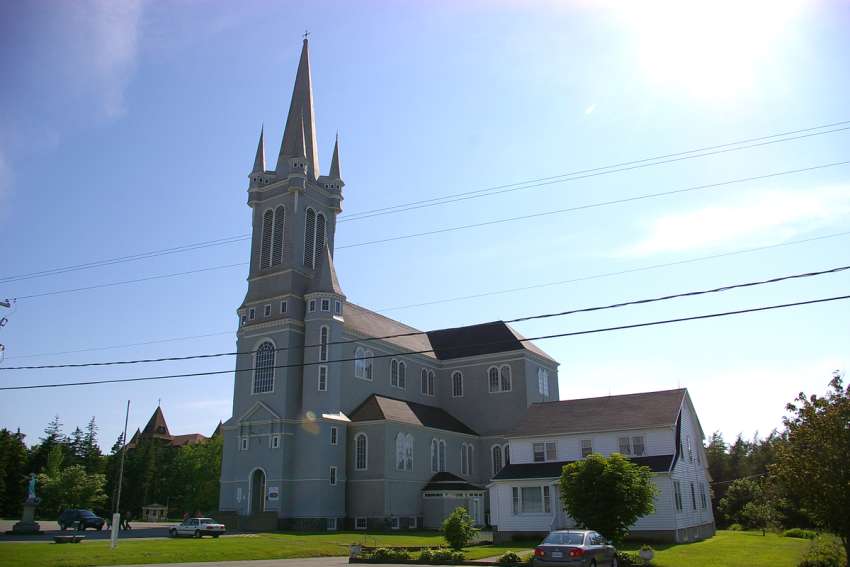“It took everyone out of the blue that this anonymous donor all of a sudden stopped replying to any attempts at contact,” said Aurea Sadi, spokesperson for the Archdiocese of Halifax-Yarmouth. “A variety of people attempted to contact him or her — I’m not too sure who it is — in August, and… nothing… quiet.”
Pierre Comeau, the president of the Société Édifice Sainte-Marie de La Pointe (Saint-Marie Building Preservation Society), an organization that has worked more than seven years to secure a long-term future for this former house of worship, said he thinks the donor was last in contact in May.
Halifax-Yarmouth Archbishop Brian Dunn was directly involved in the discussions to close this deal. He also led consultation sessions in mid-April at the three churches in the region that would be affected by the reopening of Église Sainte-Marie: Eglise Sacre-Coeur in Saulnerville, Église Stella Maris in Meteghan and St. Alphonse in Mavillette. The congregations of all three parishes appeared to have endorsed the notion of the largest wooden church in North America — at 56.4 metres tall — reopening.
Unfortunately, by September, Comeau was informed by Dunn that “the person was no longer answering calls or emails.” It was concluded in early October that “the offer had to be considered no longer valid.”
Comeau said everyone devoted to saving Église Sainte-Marie “were deeply disappointed.”
“We were so happy when the proposal came through,” said Comeau. “We used religious terms like ‘our prayers have been answered,’ and ‘salvation was on the horizon.’ Now, it is discouragement and disappointment.”
All parties are currently regrouping and figuring out the next steps. The likely path forward is the archdiocese initiating a new request for proposals (RFP) process in the coming weeks.
The archdiocese began accepting applications last December from parties interested in purchasing the building for use or demolishment so the land could be used for another project. John Kennedy, the archdiocese’s financial administrator, wrote that “preference will be given to proposals that maintain the building in some form.” And if no concrete offers emerged to save the church, partiality would be given to offers “that give back to the community in some way, during demolition.”
No firm offers emerged to save the building when the original deadline of Jan 30 arrived. Dunn told The Catholic Register that “they are willing to extend the proposal deadline into February.”
New applications did arise, including the $10 million anonymous bid.
Is the Société Édifice Sainte-Marie de La Pointe optimistic a second bidding process could author a happy ending to this saga?
“We certainly hope so,” said Comeau. “We are hoping for a second miracle, but with what happened the first time, maybe we have to be realistic and accept what comes,” said Comeau.
Église Sainte-Marie, treasured by the local Acadian community since opening in 1905, has not hosted Mass since 2019. Dwindling attendance and significant water damage throughout the structure forced the archdiocese to close the building. The Société Édifice Sainte-Marie De La Pointe abandoned its effort to convert the church into a multi-purpose hall before the end of 2022 because the repair costs stretched into millions of dollars.
Dunn is expected to follow the decrees written in the Code of Canon Law for selling a church. According to Canon 1222 paragraph 1, “if a church cannot be used in any way for divine worship and there is no possibility of repairing it, the diocesan bishop can relegate it to profane but not sordid use.” Profane in this context means secular.
What is sordid use? Cardinal Sean Patrick O’Malley, Archbishop of Boston, once articulated this concept in a document.
“The essence of this Canon’s requirement is the obligation of the archbishop to prevent uses of Catholic church buildings that would give offense to members of the faithful or be detrimental to their understanding or practice of the Catholic faith, or that would offend against Catholic belief or practice in any other way. In this regard, the archbishop must take measures to prevent a Catholic Church building from being used in ways that might draw Catholics away from the Church or otherwise damage their faith or practice.”


